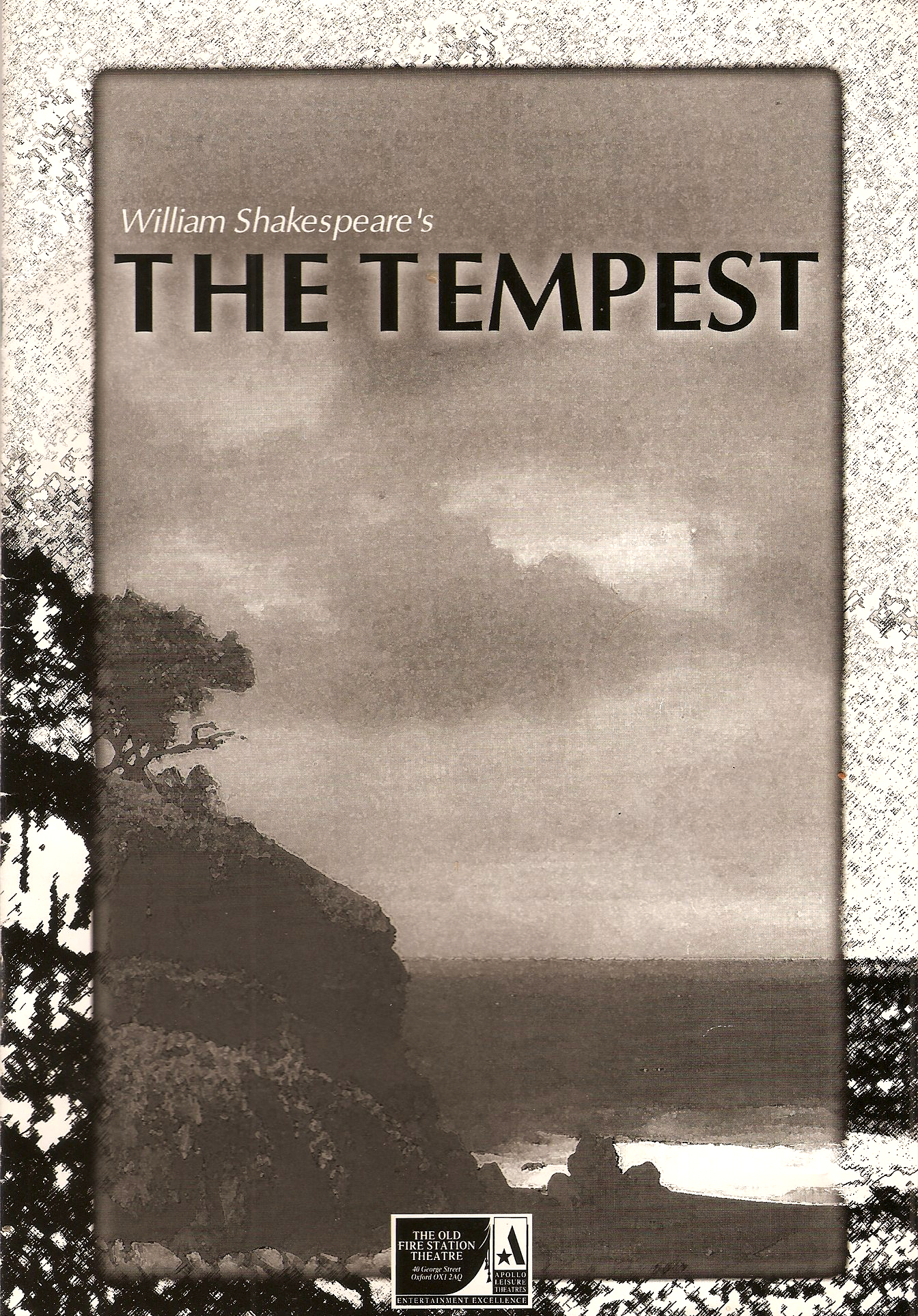
My ideas for the production of The Tempest, are fully set out in the attached programme notes.
I had directed Caryl Churchill’s Top Girls at the Old Fire Station theatre in May 1999. This was a fascinating play for just six actresses, a break after the mental, emotional and physical exhaustion of The Threepenny Opera! It was totally appropriate to use the small ‘end-on’ stage for this piece, as the confined nature of location is central to the theme of Churchill’s play. So Top Girls was to be my grand finale.
But then came a thought: how can I have devoted so much of my life and energy to theatre without giving myself the opportunity to direct Shakespeare?
I had choreographed many of Shakespeare’s plays for a variety of productions, and the main reason for choosing The Tempest as my first truly ‘active’ directorial contact with the bard was the fact that it is one of the most musical of his plays, with singing, dance and music in many of the scenes.
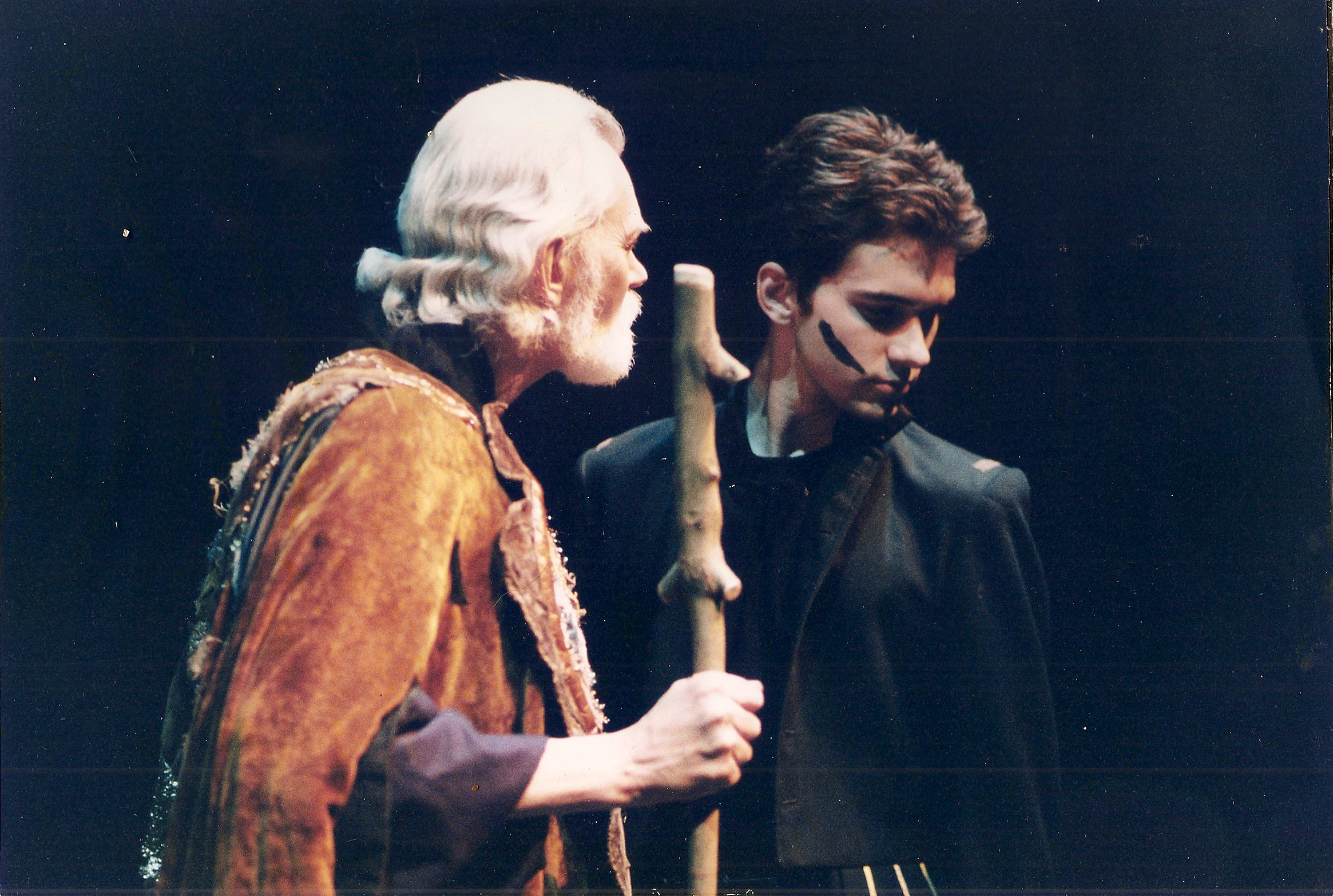
played by choral scholar, Andrew Marshall.
I converted the Old Fire Station theatre space into an island, leaving as much open space throughout the building as possible to give the impression of remoteness and distance. Some audience members were seated round the ‘island’, just a bare central area at ground level, although the majority were on the permanent elevated seating block, as had by 2000 become the norm. Using the steps rising up through this section of the audience, I hoped to give the feeling of ‘hills’, down which Trinculo and Stephano tumbled when drunk, and ‘mountains’, from which Caliban, dressed in his simple but elegant native robes, made his entrance.
One of the actors, Mark Eariss, described the first scene in which the tempest drives the wrecked boat onto the island: ‘With the bellowing sounds of the storm at sea, performers staggered across the rolling deck. The sailors climbing down thick ropes alongside audience members was a surprise and a delight; to have the performers delivering their lines among the audience added to the drama.’ One audience member noted, ’I thought the Brechtian beginning was a master stroke. It was a real surprise, but a brilliant one, totally in harmony with the contrived nature of the play and the contrived storm within it.’
In the programme I point to the distinct nature of Brecht’s influence on my interpretation of The Tempest, noted by one critic as ‘the Director’s interest in the socio-political issues present in the play’. True …
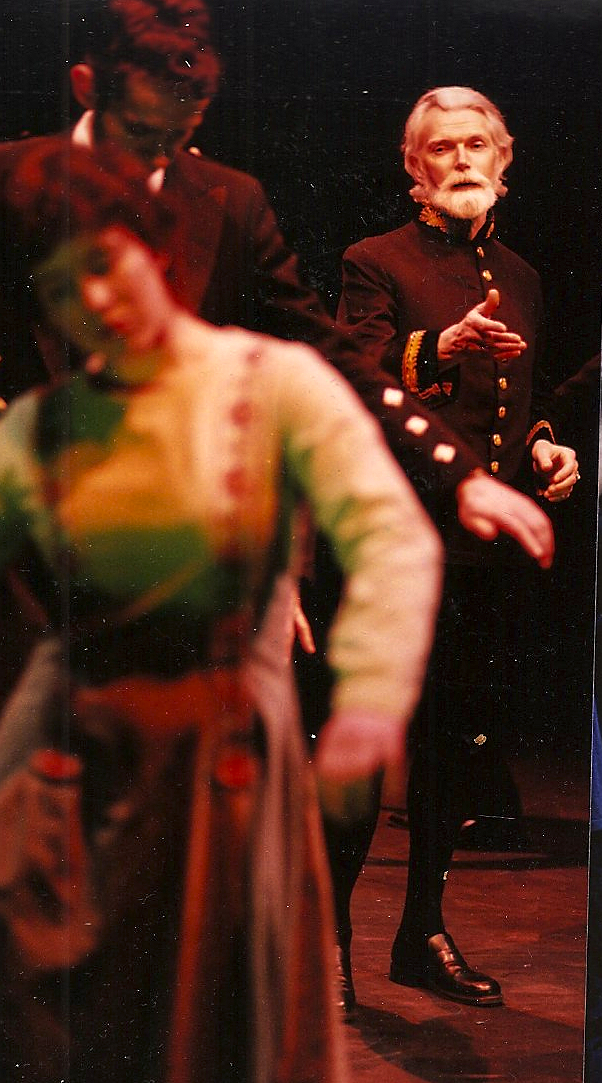
Miranda (Catriona Laing).
I had first felt Brecht’s presence in the highly political nature of the piece, with its portrayal of British colonialism in which different ‘class types’ are clearly represented. First there is Prospero, rightful Duke of Milan, his other Courtiers, (both noble and ignoble!), and then Trinculo and Stephano, the working class buffoons. There is also a natural, even supernatural hierarchy, in the case of the spirit Ariel and the ‘monster’ Caliban, in which they both play their parts, serving their master, Prospero, in their different ways.
Brecht’s influence was also present in my choice of minimal staging, allowing as much actor/audience contact as possible, with entrances and exits made through the audience at different levels. One critic noted, ‘I liked the use of side aisles and balcony so that, as the audience, I felt I was in the middle of it all, never quite sure from which direction action would happen next.’ Then there was emphasis on authentic period costume and props, together with varied use of electric sound collage, live flute and human voice to create special atmospheres.
Caliban’s understanding that ‘The isle is full of noises’, was fully realised by Musical Director, Michael Young, whose music consistently and beautifully reflected the dynamic of the piece. As the Daily Information reviewer commented, ‘the Musical Director was responsible for bringing all the creepy ’such stuff as dreams are made of’ mysticism to the island. Musical accompaniments imbued each character with extra depth, the flute for the spirit Ariel, menacing synthesized sounds for the autocratic Prospero and the most unusual Balinese gamelan/Tudor waltz blend for the lovers’ dance.’ The gamelan was also used for traditional feminine Balinese dancing, the idiosyncratic movement style and Oriental costume contributing to the exotic flavour of the island.
In the first place, I was supremely lucky that a Sri Lankan medical student at the University, Prasanna Puwanarajah, (now a Director at the RSC), should come to audition, along with a group of actors who had recently performed with him in a production of King Lear at the O.F.S. The King Lear cast included Colin Burnie as Lear, whom I had already ear-marked for Prospero; he was familiar with the part and had previously acted for me, although only in the small role of Doc in West Side Story some twelve years earlier …
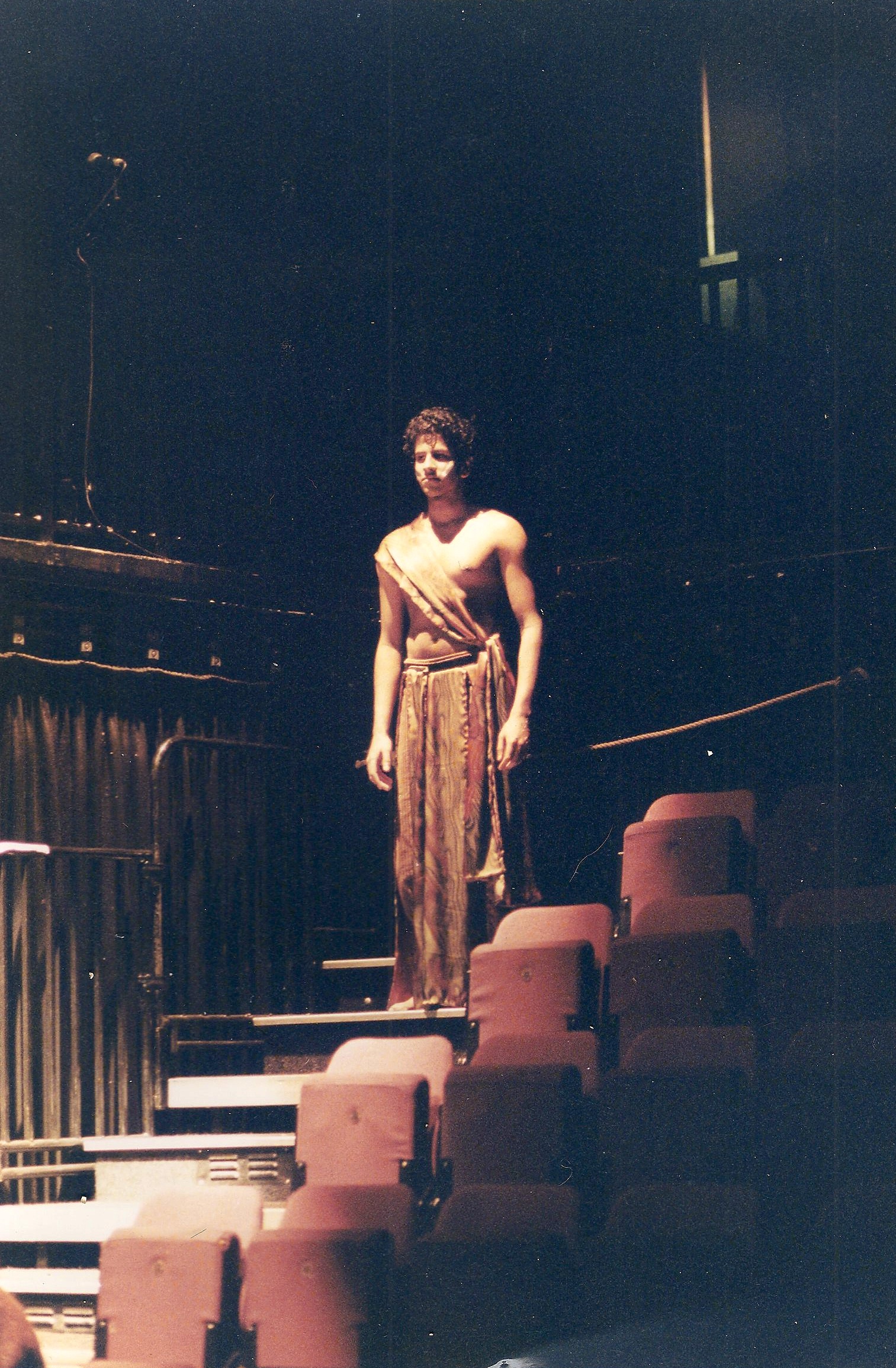
his 'stately entrance' though the audience.
I was thrilled to give the role of Caliban to Prasanna, who fulfilled exactly my idea of an indigenous native of the island, his personal wisdom and dignity fostered by a deep understanding and love of his natural environment. He looked highly impressive in his native robes as he made his stately entrance down steps through the audience. Critic, Henry Blyth, commented, ‘I very much liked your handsome Caliban, and the hint that the bare-foot earth-motherly Miranda might have been better employed raising lots of little Calibans than some more prissy Ferdinands!’
The ‘white trash’ - Trinculo, played by Chris Walters (who had acted in many productions from West Side on, including a memorable Mr Cellophane in my 1994 production of Chicago), and Stefano, Fred Pargeter (Narrator in Into the Woods, Lawyer in The Wall etc.), were both ODT ‘old hands’ so I knew their talents well. As the two comic villains, they formed, according to Chris, ‘a sort of music-hall double act, with me as Laurel obviously’, tempting Caliban to disorder with their promise of alcohol and ‘fine clothes’. I was confident that they would provide the right humorous element, which they did. Henry Blyth said, ‘two beautiful vignettes these, lovingly worked up and provided with memories of past humiliations; I keep coming back to them.’

Ariel was played by gifted Keble choral scholar, Andrew Marshal, who sang beautifully to Michael Young’s live flute accompaniment. Ariel remained high on the theatre balcony throughout to symbolise the ‘other worldly’ quality of the spirit; ‘I liked the way he multiplied at times all round the gallery and the whole way in which the music fitted’, as one audience member noted. Although, in one sense, Ariel conforms more strictly to Prospero’s commands than Caliban, he clearly maintains his own identity throughout.
Some unsolicited testimonials:
‘The music was wonderful. It blended with and enhanced the play beautifully so that it all became an integral whole. This was true too of the movement in the play. So much was beautifully choreographed, so that I was very aware that the dance background of the director and company had informed the whole. There was a sensitivity to movement and shape throughout, most obviously and impressively demonstrated in the ship scene and the banquet scene, but integral to the whole production.' -Tessa Cullen
‘The O.F.S theatre was quite transformed into a magical, surreal island world and the audience enchanted.’ -Dave Parrett
‘I am happy to say that a Greek girl with some knowledge of English thoroughly enjoyed this, her first Shakespeare play at 11 years of age.’ -Jean McConnell
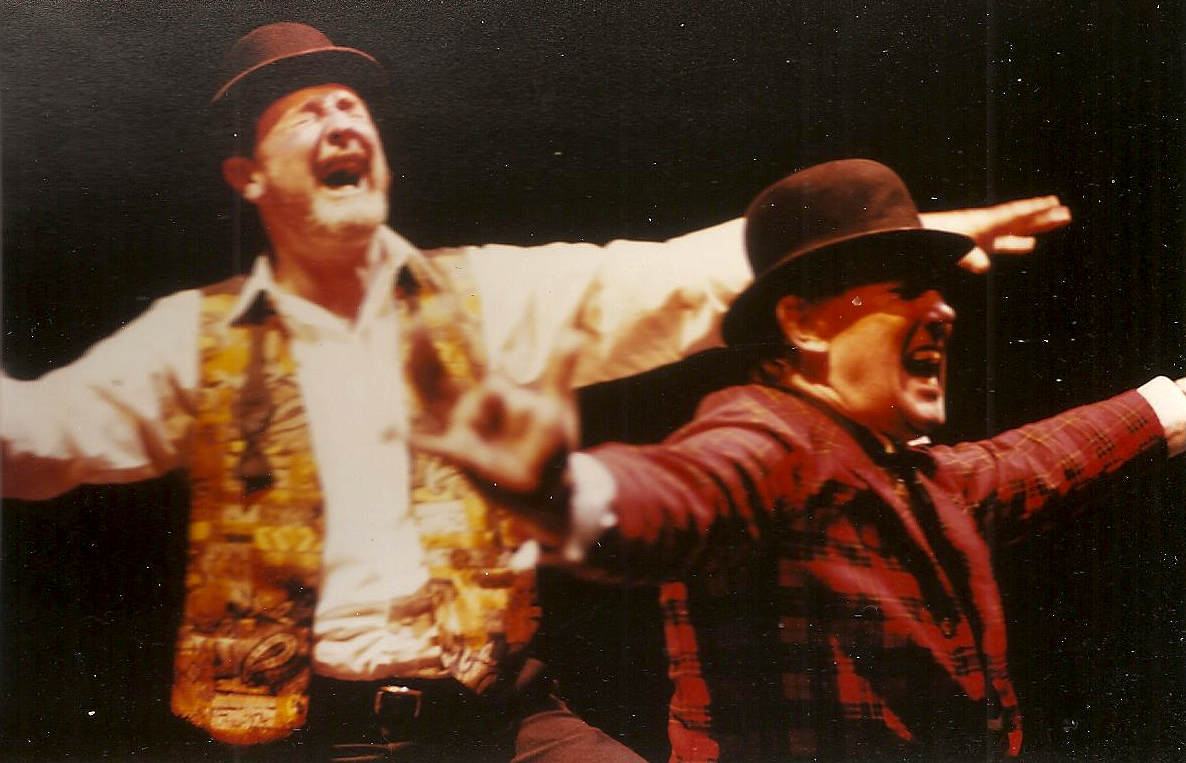
Pargeter) enjoy their
'music-hall double act'.
Although not everyone responded so positively to my interpretation of the play and characters, (especially Caliban, who was certainly far from your usual ‘monster’ type!), I was in general pleased. I had achieved the effects I wanted, and the production gave me the confidence to direct more Shakespeare plays.